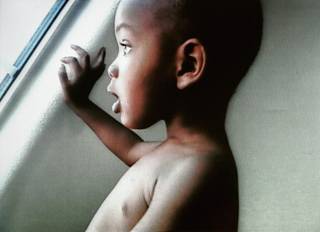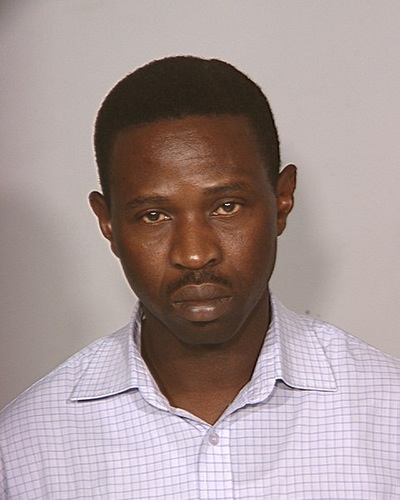Monday, March 8, 2010 | 9:23 p.m.
Sun Archives
Jury deliberations are set to begin Tuesday in the case of 42-year-old Victor Fakoya, on trial for murder in the death of the toddler son of a close friend and fellow Nigerian immigrant.
Daniel Jaiyesimi, 2, died Aug. 11, 2008, at University Medical Center after three days in intensive care. Prosecutors allege injuries inflicted by Fakoya – possibly shaking, blunt force trauma or a combination of the two – are what killed him.
Fakoya’s attorneys have suggested a myriad of other possibilities might have caused the boy’s death. The trial entered its fifth week Monday.
If convicted, Fakoya could be sentenced to life in prison.
Daniel and his parents, Musediq and Toyin Jaiyesimi, were living with Fakoya and his wife, Lola, along with the Fakoyas’ two small children, in the Fakoyas’ two-bedroom Las Vegas home at the time of Daniel’s death.
The Fakoyas were helping the Jaiyesimis get on their feet as they adjusted to life in the United States. The Jaiyesimis had moved from Nigeria to Las Vegas in December 2007 after the Fakoyas agreed to be their host family. Victor Fakoya and Musediq Jaiyesimi had a friendship dating back to 1992, when the two men attended the same college in Nigeria.
The two families shared child-care duties as all four adults in the home worked.
Prosecutors say based on the timeline of events the day Daniel was taken to the hospital, Fakoya is the only person who could have caused the boy’s injuries. Throughout the trial, a series of medical experts from the prosecution and the defense testified as to his injuries and what could have caused them.
“Every single treating doctor in this entire case agrees that Daniel died of non-accidental trauma,” Deputy District Attorney Jacqueline Jeanney said in her closing arguments. “While in the defendant’s care, Daniel went unconscious and was never normal again.”
Fakoya’s attorneys said what happened to the boy was possibly caused by an infectious disease, an undiagnosed health problem or even an accident. Whatever happened, it wasn’t Fakoya’s fault, they said.
Norm Reed, one of Fakoya’s two court-appointed attorneys, implored the jury of seven men and seven women, including two alternates, not to convict his client “based on a possibility.”
As part of his argument, he grabbed a metal baseball bat and swung it at full force at a cardboard box. He said he was illustrating discrepancies in testimony from one of the state’s medical experts, who said the force that caused injuries to Daniel’s head was stronger than the force a Major League Baseball player uses to swing a bat.
“When you look at all of these doctors, there’s a lot of inconsistencies in what their (the prosecution’s) own doctors say,” Reed said, holding up the bashed-in cardboard box.
He pointed to inconsistencies in the timeline of events the day Daniel was taken to the hospital. He also said his client, who in his own testimony Thursday told jurors he loved Daniel “like a son,” had no motive to kill the boy.
“There is no way that Victor Fakoya is capable of doing the kind of atrocities that the prosecution alleges,” he said. He reminded the jurors that about a dozen character witnesses had testified on Fakoya’s behalf, saying his client had “impeccable character.”
“Who comes forward to support someone they believe is a child abuser?” he asked rhetorically.
“Victor Fakoya is not a murderer. He is not a child abuser. He did not do this and he is not guilty,” he said.
Throughout the trial, prosecutors contended there was tension between the two families that came to a head in August 2008. The two toddlers in the house, Daniel and the Fakoyas’ daughter, Elizabeth, eight months older than Daniel, played rough and made noise.
The way the children acted irritated Fakoya’s wife, Lola, Musediq Jaiyesimi testified.
During arguments Monday, Lola Fakoya sat in the gallery, sometimes shaking her head.
Chief Deputy District Attorney Vicki Monroe, in her rebuttal to Reed’s argument, said that on Aug. 7, 2008, Fakoya snapped.
“People snap, and when they snap, they walk over that line. That’s when things happen, like what happened to Daniel,” she said. “Something happened to this child. Someone abused this child … I would submit to you that person was the last person with him before he stopped acting normal.”
She drew into question the credibility of several experts who testified for the defense. She also pointed out inconsistencies in Fakoya’s statements to police at the time of Daniel’s death and statements he made when he testified.
“He has a guilty conscience,” she said. “The evidence is clear that Daniel Jaiyesimi died of a fatal head injury.”
The Clark County Coroner’s Office said Daniel died of a subdural hematoma due to child abuse. The death was ruled a homicide.
If Fakoya is convicted, jurors can find him guilty of first-degree murder, second-degree murder or voluntary manslaughter.



Join the Discussion:
Check this out for a full explanation of our conversion to the LiveFyre commenting system and instructions on how to sign up for an account.
Full comments policy